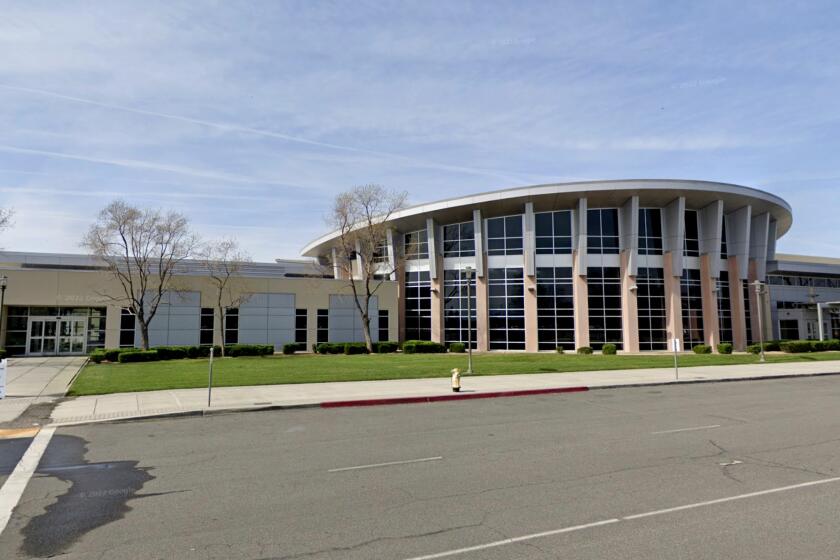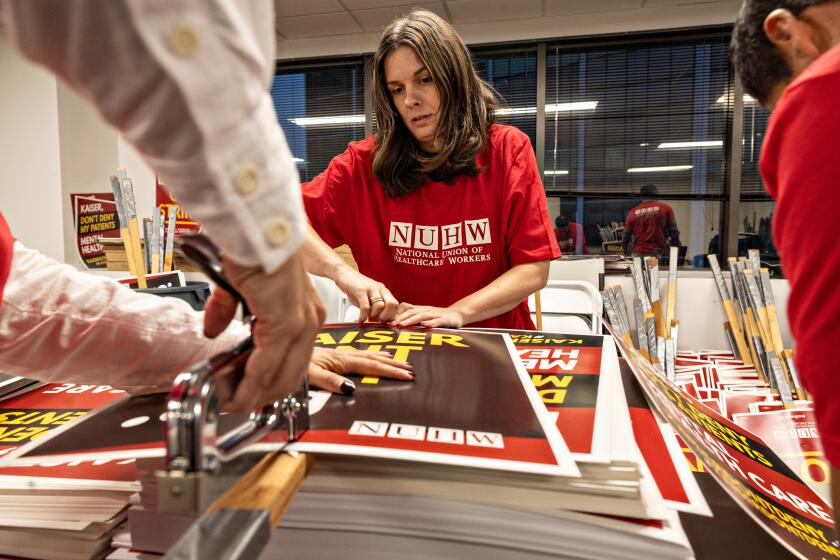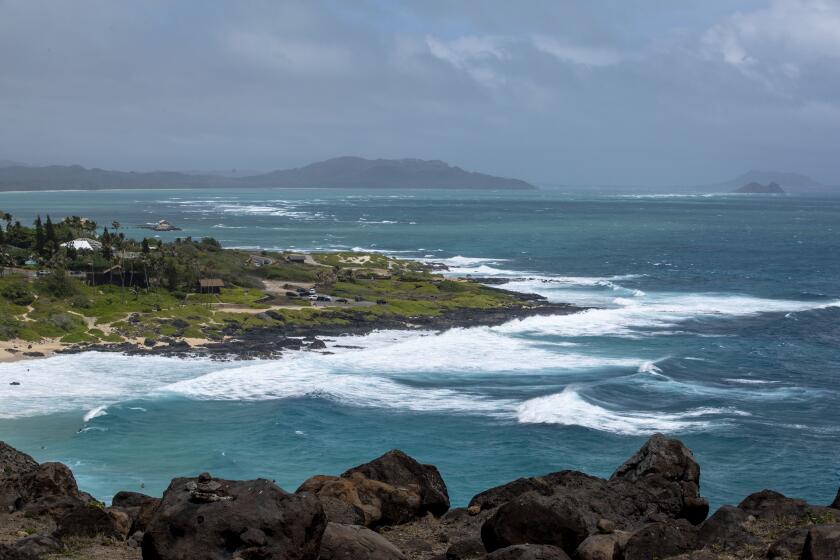Left in the Dust : Boat Owners Upset at AQMD Ruling on Kaiser Port Permit
After 24 days of testimony spread out over four months, a field trip to the Port of Los Angeles, and the accumulation of enough conflicting evidence, exhibits and transcripts to fill a filing cabinet drawer, the final tally was not even close.
The hearing board of the South Coast Air Quality Management District voted 5-0 last week to issue two crucial operating permits to Kaiser International, the port’s largest exporter of coal and petroleum coke and the nemesis of dozens of pleasure boaters who say it is one of the area’s worst polluters.
“Five nothing! Not even one dissenting vote!” exclaimed an incredulous Harold Struthers, president of the Los Angeles Boat Owners Assn., a group of about 300 boat owners in Los Angeles Harbor. “We are very disappointed.”
Waging a War
The board dealt a devastating blow to Struthers and others with boats in the West Channel who have been waging a war against Kaiser International for more than two years. The boaters complain that black dust from the company’s 26-acre facility on Miner Street pollutes the air and damages their vessels. They want air quality officials to force the company to install more effective air pollution control equipment or shut operations.
Now, with the board’s decision to issue the permits, the boaters have lost their most powerful form of leverage. The board still must hold a hearing in December to decide what conditions to place on the permits, but AQMD officials said the panel cannot require new pollution control equipment.
“We don’t know what we are going to do next,” said Kim Burgher, who lives on her boat at Holiday Harbor, the closest marina to the Kaiser International bulk-loader. “But this is not the end. They have won the battle, but they haven’t won the war.”
Last fall and winter, boaters complained enough to the AQMD about dust that inspectors cited the company three times for creating a public nuisance. Based on those complaints, the AQMD staff refused to issue the operating permits to Kaiser International, saying there was sufficient reason to believe that the company would continue to create a public nuisance. The company still operated, however, while the hearing board considered its case.
Fallout ‘Almost Nightly’
“It really is a simple case,” said Cindy Simovich, deputy district counsel for the AQMD, before the board vote. “It is a matter of having a source of dark black particulates very close to receptors--the boats--with the wind direction conducive to the transport and fallout of the particles on the boats almost nightly.”
But in the end, the case was not so simple. Indeed, it became so convoluted--with abstract models and other theoretical testimony--that B. C. Escobar, the board’s engineer member, confessed he was frustrated by the lack of “real evidence.”
Kaiser International President Richard E. Holdaway, who vehemently denies that his company is the source of the black dust, hired a former AQMD attorney to help him prove it. In April, the company appealed the AQMD ruling to the hearing board, claiming that it was being unfairly singled out for an air pollution problem prevalent throughout the harbor area. Six months later, the hearing board agreed.
“It is an appropriate decision,” said Holdaway, who said he spent about $200,000 on the appeal. “I think our company has done everything reasonable to be good neighbors and meet our social responsibility. And we will continue to.”
Holdaway’s victory did not come without controversy. Last summer, the Port of Los Angeles, which leases the $23-million facility to Kaiser International for about $2 million a year, invited the hearing board to the port for a tour and private luncheon. During the luncheon, port officials, who supported the company in its appeal, presented a slide show about plans to eventually relocate the facility away from the marinas.
Fiery Exchange
The meeting set off a fiery exchange of letters among the AQMD staff, its governing board and the hearing board over concerns about impropriety. The boat owners, meanwhile, called on the hearing board to disqualify itself from the case--a suggestion the board unanimously rejected.
In the wake of last week’s ruling, several boat owners and other San Pedro residents who joined the case against Kaiser International blamed their defeat on the port’s lobbying effort. They said their fate was sealed about three weeks after the June luncheon when Mayor Tom Bradley, who has received political contributions from Holdaway and has often pointed to the success of the port as one of his greatest accomplishments, wrote a letter to the hearing board urging it to issue the permits.
“I think we were doomed from the beginning,” said Beatrice Atwood Hunt, president of a small San Pedro environmental group that supported the boat owners. “I believe the evidence was overwhelming on our side. But I am still smarting over the fact that they had that lunch with the port.”
The boaters’ defeat has been all the more difficult to accept because the board, while unanimously voting to issue the permits, agreed with some of the boaters’ complaints.
Company Tied to Dust
Oddly enough, a majority of those who voted in favor of issuing the permits publicly tied the company to the disputed black dust. At one point, board member Esther Lewin appeared perplexed when Chairwoman Coralie Kupfer explained that they could not force Kaiser International to control the dust while also ruling that the dust did not constitute a public nuisance.
“I would like to find some way for an improvement in the situation down there. . . . I based my decision not on the fact that there was no dust ever seen at the Kaiser plant, but that the dust did not create, in my mind, a public nuisance,” Lewin told Kupfer. “But that does not say to me that there is no dust.”
Earlier, board member Harold V. Brown also said that he believed the company was creating dust and that the AQMD staff should have required Kaiser International to install control equipment as a condition for the permits.
“Unfortunately,” Brown said, “some of the products handled are black and produce dust. . . . The bulk-loader facility certainly has the potential of producing the dust. But we have also heard plenty of evidence to indicate that the dust can be controlled. . . . I feel permits should have been issued with conditions to minimize dust.”
Even Kupfer, whose closing comments were some of the strongest in support of Kaiser International, said she would like to require Kaiser International to build so-called “dead chambers” around its equipment used to dump loads of coal and petroleum coke from railroad cars. Boaters have pointed to the dumper as one of the primary sources of the black dust, and the chambers were one of several measures suggested during the hearings as a way to contain it.
“But I don’t think we have the authority to do that,” Kupfer said. “. . . In order to do that we have to find that Kaiser is a nuisance.”
Escobar, the engineer, went so far as to state that the dumper “has created a public nuisance,” but he blamed the AQMD’s engineers for not working with Kaiser to come up with a solution.
What seemed to sway the board members most were arguments from Kaiser International and the Port of Los Angeles relating to the economic importance of the facility. At the start of the hearing, Kaiser International attorney Steven A. Broiles argued that even if the board concluded that dust from the facility is landing on nearby boats, it must weigh the inconvenience to the boaters against the company’s economic significance.
Several days passed as the company outlined its export and import roles in the Port of Los Angeles as well as its ties to the mining industry in Colorado. Broiles said 500 miners would lose their jobs if Kaiser International was forced to shut down because it is the only facility in the country that can accommodate the large ships used to transport coal from Colorado to steel mills in South Korea.
Miners Out of Work
“You have to balance the inconvenience to people who have to wash their boats more than they might like against the 500 guys at the mines and the 15 guys at Kaiser who would be out of work,” Broiles said in an interview.
Several of the board members mentioned economic factors when casting their votes. Jack C. Dutton, for example, talked for 10 minutes about the history of the Port of Los Angeles and its contribution to growth in Southern California. Brown pointed specifically to the importance of Kaiser International.
“I feel Kaiser provides needed services to the community as well as to other communities,” Brown said. “The operation of the facility directly affects the employment of many people locally and in other states.”
Added Kupfer: “This is a working port. We are not talking about Newport Beach.”
The board said boaters who do not like putting up with the inconveniences of an industrial port should move their vessels to more pristine setting--with Marina del Rey being suggested as one alternative.
“If the harm and nuisance is so great as to warrant shutting down Kaiser, the owners of the boats have an option,” Kupfer said. “They can go somewhere else. They are not stuck there as you would be with a home.”
Several boat owners and other San Pedro residents took offense at the board’s remarks, saying the members appeared more concerned about economics, jobs and the well-being of the port than about their mandate: namely, the regulation of air pollution. The San Pedro and Peninsula Homeowners Coalition, which represents 20 neighborhood associations, voted this week to write a letter to the AQMD to “communicate our displeasure” about the board’s vote.
“I think the comments made by the AQMD are insulting,” said Goldie Otters, a coalition member who lives less than one mile from the bulk-loading facility. “There’s no thought of the people who are breathing that stuff. . . . It’s an oily dust. You try to scrape that off your window, and you get an oily rainbow.”
As for the boat owners, they said they will continue to scrub the black dust from their vessels and continue to file complaints with the AQMD. If the AQMD is able to verify enough complaints, the district could return to the hearing board and ask that it revoke the operating permits. Simovich, the AQMD attorney, said the district has no plans to request a revocation hearing.
More to Read
Sign up for Essential California
The most important California stories and recommendations in your inbox every morning.
You may occasionally receive promotional content from the Los Angeles Times.









